Hope to Hope Town: Part Five
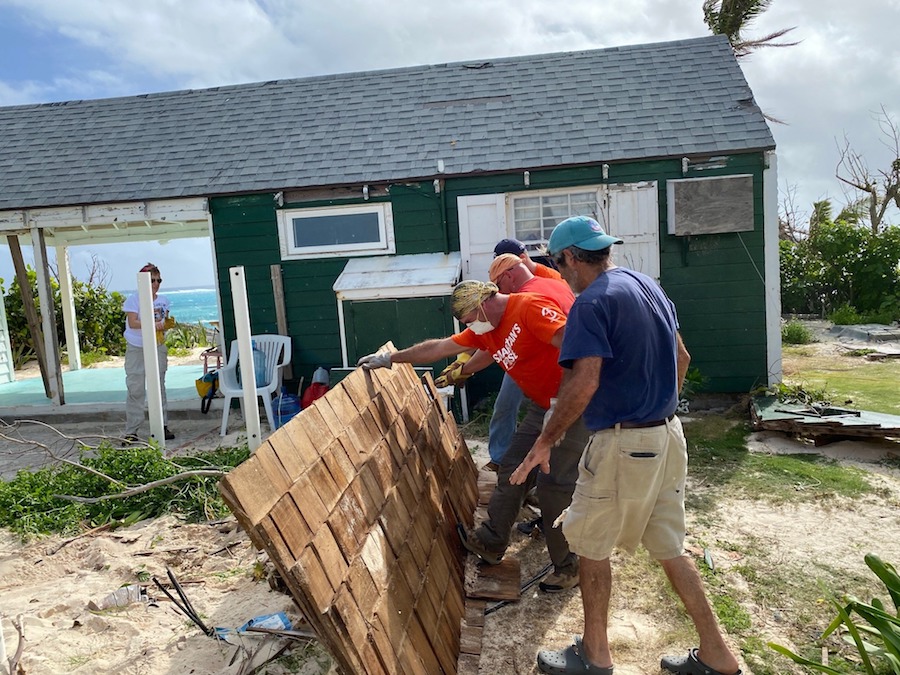
As we were unpacking the equipment and supplies in the old settlement house in Hope Town, two people with clipboards arrived in orange shirts. They introduced themselves as Ed and Michael from Samaritan’s Purse, saying they had a work order to check what had been done on the house before we arrived. I looked at them wondering who they were, and what, really, they were doing there.
They checked the paperwork and said that sand had been removed from the house, and ‘um…lets see, we checked three cisterns. Two were OK and we pumped one.’ There is a note to check for mold as people would be moving in.
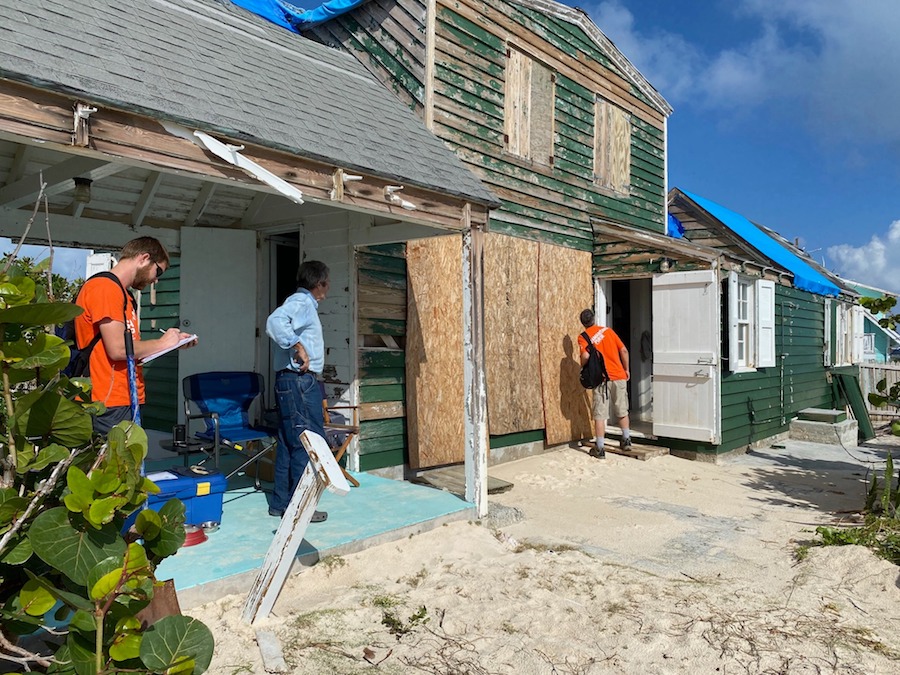
‘hmmm,’ I thought. Sounded right. That would be us moving in. Several feet of sand had been removed, the center upright support in the living room had a ‘high sand/water mark’ of a couple of feet. Some sand was on the walls, sticking to the ceiling, quite a bit in the corners and a thick dusting on the floor. But much better than three feet deep. How had they removed it, I wondered? It would be like moving a small beach.
‘We’d be happy to check the mold situation, and anything else that we could help with.’
Who ARE these people? I thought as I stood at a distance, watching them with a skeptical urban eye. Written in sharpie on their orange shirts were their names, Ed and Michael. They had introduced themselves, after all.
Brid took them through the house.
‘We see mold in the bedroom off the breezeway, and the kitchen. We recommend that you do not use the bedroom above the main room that has the wall pushed out. There are a lot of books that are wet and moldy, and some of the clothes and furniture should be removed. Otherwise it looks pretty good. We’d be happy to schedule time tomorrow. We move everything away from the walls and cover whatever is in the room. We sweep the mold infected area and then spray with a treatment called shock wave. It will need to dry, then we spray again and sweep it so it penetrates, then we wipe it down with a rag. If you want to read about the solution, we have that information. It is not unhealthy to breathe, though we will wear masks when we do the treatment. Mostly because we’re disturbing the mold, though.’
We agreed to a time and they said to expect a team of 5 or 6 volunteers with a manager, and left, picking their way through the debris on the front lawn.
When the team arrived, they did just as Ed had said they would, moving the furniture away from the walls, and doing the mold remediation. They also gathered the moldy books, clothes and furniture. The kitchen pots and pans were rusty and needed to go as well. We received approval from the owners to remove anything that was rusty, damaged or moldy – and gave the team the go ahead. They piled and bagged and hauled the items to the side of the front yard for eventual pickup.
At the end of the long day, the house was mold free and anything that was affected by mold or rust had been removed. The pile of wood that had been the generator house (picked up by the storm and dumped in a heap in the front yard) had been moved, the twisted cables that had been power were coiled and pulled to the side.
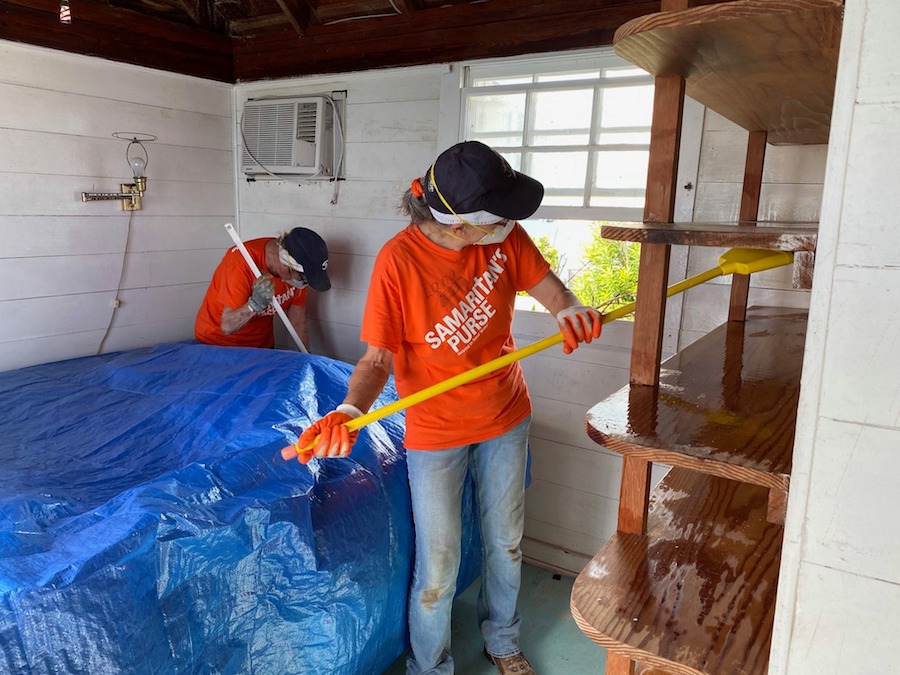
We gave them cheese and crackers and sat on the ocean side looking at the beautiful view.
I asked about the organization, about the founders, about Michael's prior assignments. ‘I graduated from nursing school and volunteered to assist in Nepal following the earthquake – I had never been on an airplane before, had never been out of the country. Within 24 hours of graduation, I had a passport, camping equipment and was packed and on a plane for Nepal for two months. Since then I’ve been on assignment building a field hospital in Mosel, Iraq, my teammates set up an ebola clinic in the Congo and now we’re here. Samaritan’s Purse is based in Boone, NC and Billy Graham’s son Franklin heads it up. It is funded by donations. I’m on staff, and volunteers rotate through on a weekly basis. We work 6 days a week. We first deploy a disaster response team to the affected area, then follow it up with a rebuilding team. We are still in disaster response here at Elbow Cay. ‘
They gathered up their supplies and I walked them across the newly cleared sand to the fence.
‘You should be good to go now, you can sleep in the room across the breezeway’, Michael said. ‘Let us know if you need anything else.’
‘Thank you again,’ I said to the group as they stood on the road.
‘Would you like a short prayer?’ Michael asked. Huh? What? I thought. ‘Absolutely,’ I said. What’s this about, I wondered? They put all their supplies down and Michael led the short prayer, one of completion and health and for guidance in the work we would be doing on the island. It lasted about 30 seconds and they gathered their things and walked down the hill to the houses in which they were staying in the center of town. I watched them go and turned and walked into our mold free house. What just happened here, I thought...and what about these people who were so cheerful and warm and incredibly hard workers?
I saw Michael early the next day in the center of town and asked what the projects he was working on. ‘We’re gutting and clearing debris from a house down past Vernon’s bakery, one across the harbor, and putting a tarp on a roof up the hill here.’ I asked if I could work on one of them. ‘Sure, he said. We’re starting in 15 minutes – do you have work boots and gloves? We have masks and goggles and hazmat suits for black mold and insulation. Why don’t you meet the team down past Vernon’s grocery? You can’t miss it, look for the orange shirts.’
‘OK’, I said and headed back up the hill to put on jeans, boots and to get my gloves. I grabbed a water bottle and sun screen and headed back, finding, as he said I would, about 8 or 10 orange shirted workers. Ed, whom I had met before was heading up the project. ‘Hello!’ he called out as I picked my way through the debris leaning on the side of the house. ‘Welcome,’ he smiled. ‘Inside or outside?’ I could see people with crowbars removing cabinets and appliances inside, and a team with a chainsaw outside, pulling wood and debris from against the house and piling it on the tiny road. I opted for outside and I dug in and started piling twisted pieces of gutter and wood with nails hinges and pieces of windows and doors and stacking them in the designated piles. The debris was from a house that had lifted completely off its foundation and been tossed across the road. It lay in a heap crushing the house next to the one we were working on, but large chunks of it ended up in the tiny side yard and against the house. The house we were working on belonged to Jack, of Captain Jack’s restaurant. Jack drove a small truck and loaded the debris and drove it to a mid island dump, where barges would someday pick it all up. I was working with Brian from New Hampshire and a couple from Missouri and Cindy from Florida and so ready to quit at lunchtime, but put on more sunscreen and drank more water and tried to keep up with the energy and determination of those with whom I was working. Really, I thought? Is everybody this amazing?
When we finished for the day, the house was gutted to the studs, the yard was clear of debris and I was EXHAUSTED. I had made 5 new friends and laughed and talked as we worked together. We teased Tim who insisted on bringing the ‘sled’ to use for pulling out huge pieces of debris when we said it was more trouble that it was worth, and then ended up using it all afternoon. ‘You’re the sister I never had!’ he laughed as we were still talking about the useless sled on the 9th trip out.
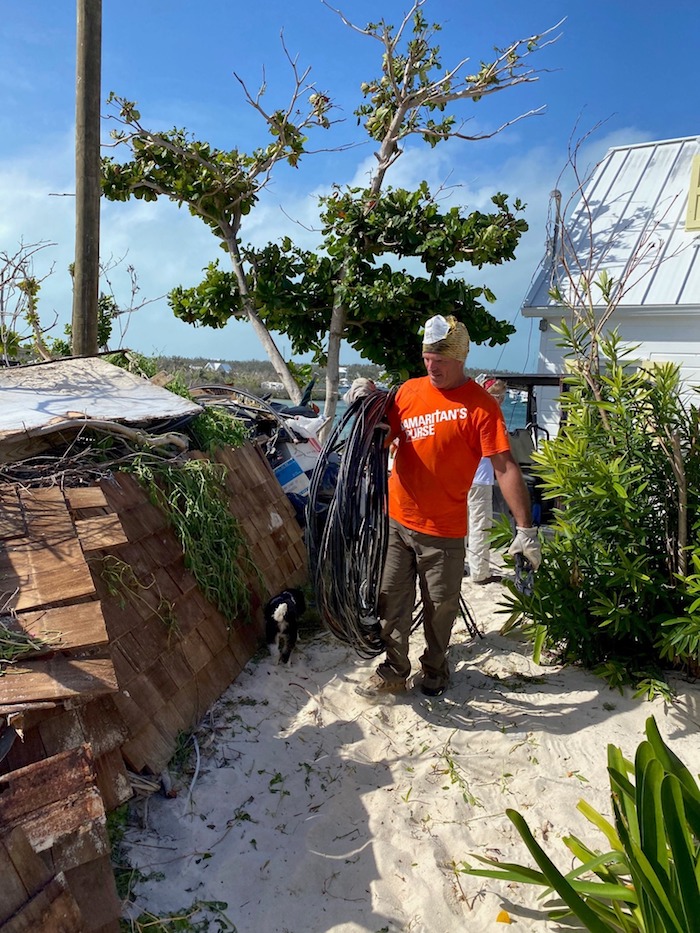
I dragged myself home, walking past Vernon’s bakery where Brid was fixing the roof and asked him when he was finishing as I needed a SWIM. He said to hang on, he was coming off the roof in 5 minutes when Vernon’s bread was out of the oven, so we walked up the hill with a hot loaf of bread and the ocean waiting for us - as that, followed by a solar shower, was how we bathed.
I worked on the next house with Michelle from Australia who showed me how to use the long crowbar to remove the tongue in groove paneling from the walls – ‘just put some muscle and a lot of leverage and it comes right out! She said. Another project was the Wyannie Malone museum, (named after the original Loyalist settler in 1785), thinking I would spend my time archiving and sorting and working with artifacts – and yes, that was the second day, but before that happened, the insulation and duct work from not one but two air conditioning units in the attic had to come out. Full hazmat suits and goggles and gloves and masks and two of us went up the ladder all morning with strict 10 minute breaks and water every hour as it was HOT up there. We could only work in the morning as the afternoon was impossibly hot, so we worked fast and took breaks and got it done, swept clean. The next few days were spent going through still damp and moldy documents and photos on the third floor, and then moving to the lower floors and exhibit pieces.
As I worked with Samaritan’s purse on various projects over the month, I found that there was nothing they would not tackle. There was expertise available for every project, there were safety measures, there were breaks and lunch before heading into long afternoon hours; but the common denominator was good humor and dedication and energy and purpose.
The purpose? To make sure people are safe, warm and dry. To restore hope. ‘It’s that simple,’ Ed said.
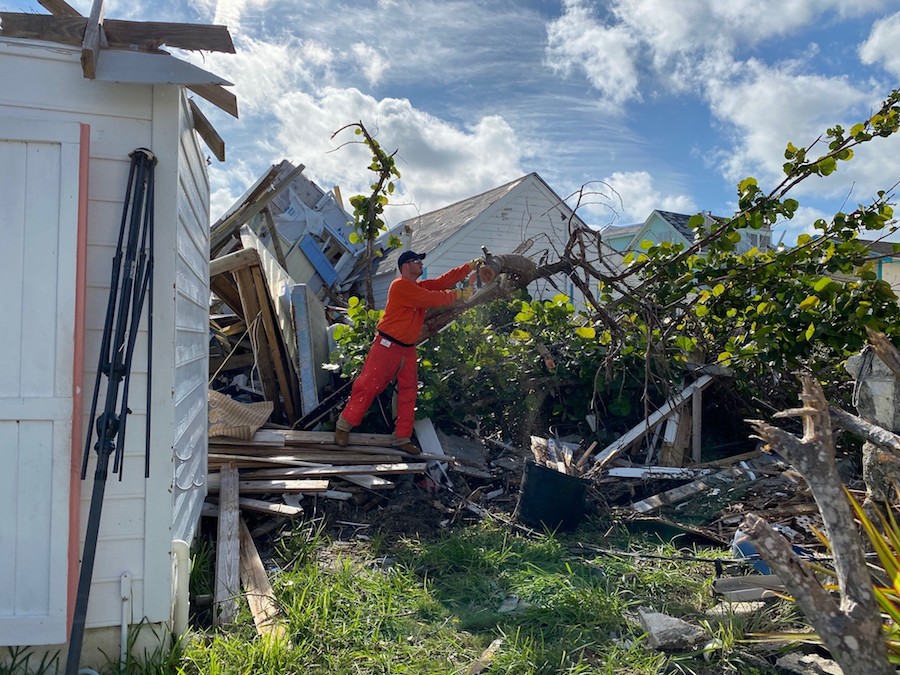
But watching them over the month, working with the volunteers from all over the US and Canada, working with the project managers who were master carpenters, construction engineers, heavy equipment operators in their home states, was amazing. But mostly watching them work through each project as if, at that moment in time, that homeowner and his house was the most important project on the island. Many times the owner was overwhelmed in so many ways and feeling, in many cases, hopeless. Samaritan’s Purse cleans and fixes and ‘mucks out’ and put on tarps to keep the rain out until supplies come in for a new roof. Sometimes they go through the ripped and twisted pile of debris that is what remains of a house -– and carefully, find whatever Dorian left behind. They find the framed picture or the wedding album or the special keepsake from a relative (in one case a delicate porcelain figure was in the rubble, undamaged) and return what they can before removing the remains of the house, leaving a clean place to rebuild the houses, and their lives. Sometimes just being there creates a safe environment for the person to talk, to grieve, to cry when they had not allowed themselves to do so. The Samaritan’s Purse worker will stop and listen, and hold and comfort when that is what is needed at the time - its whatever makes the person feel safe and cared for and gives them an opening for hope, and the ability to perhaps look ahead.
Cindy and Jim, new friends we met from Michigan and second homeowners, were on the island making repairs on their house. ‘What have you been doing?’ they asked me. I told them about Samaritan’s Purse and they said they had an extra day before going home. ‘Go find Michael at 8:30 in front of the Puff House,’ I said, pointing to the center of town. ‘Wear work boots and gloves and they’ll put you to work’.
We met them for dinner before they left and I asked how it went. ‘It was amazing,' Cindy said. They assigned us to a house near the south end. We followed in our golf cart, and kept going until we were two doors down from our house. The owner was a pastor named Ricky. When the three golf carts drove up with all those orange shirts, he burst into tears. He was overwhelmed by the support.’
She went on, ‘It was wonderful. We met a neighbor, worked with awesome people and I got to use a sledge hammer all afternoon!’ ‘What did you think of Samaritan’s purse overall?’ I asked later before saying goodbye.
‘It’s an amazing organization.’
‘In what way?’ I asked.
She thought for a long minute.
‘There was a critical mass of selfless people doing things for others without personal gain,’ she said finally.
‘I am so glad we had that experience.’
*/
We said goodbye, gave them a hug and promised to stay in touch.
